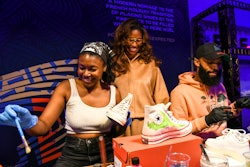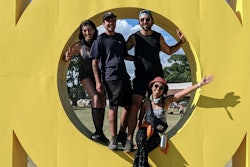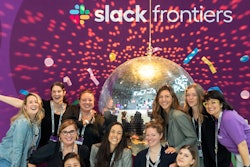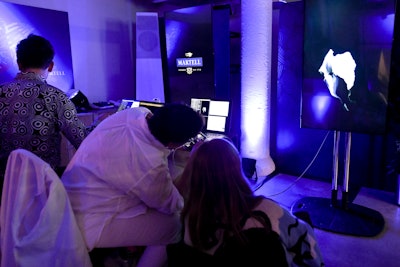
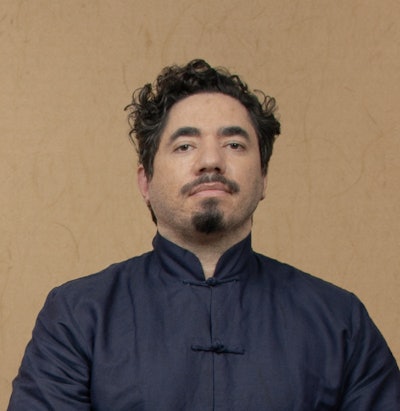 Dr. Theo PapatheodorouPhoto: Courtesy of Dr. Theo Papatheodorou
Dr. Theo PapatheodorouPhoto: Courtesy of Dr. Theo Papatheodorou
How he got his start: Dr. Theo Papatheodorou studied psychology and philosophy in college—but by the time he completed his degree, the lure of the internet, and its associated technologies, was too strong. He went on to earn a masters degree and a PhD in computer science at London's Imperial College. After graduating around 2007, he discovered the magical world of creative coding and computational art. He started his professional career as a lecturer in the Athens School of Fine Arts before moving to London and Goldsmiths University, which is known for its computational arts faculty.
"It was in London and through some creative hackathons that I met people with whom I founded Random Quark - Creative Technology Studio," Papatheodorou says. "We started with small clients and small personal projects, but good documentation and a good web presence started bringing in bigger clients and commissions—and soon our first events."
On the academic side, Papatheodorou was teaching creative coding, machine learning for the arts, and graphics courses at Goldsmiths. When he joined, he took over an ailing MA program in computational arts. "In a few years, I managed to take it from having 10 students to 120, and it became the flagship program of the department and arguably the most famous program of its kind in Europe," he says.
After almost a decade London, Papatheodorou decided that a change of scenery was necessary. At about that time, the Hong Kong University of Science and Technology got in touch and recruited him as a professor for its new campus in Guangzhou, China. "They were setting up a new department called Computational Media and Arts (CMA), and they wanted some of my expertise in running programs of that nature," he I moved to Asia in October 2021 and haven’t looked back.
What innovation means to him: Papatheodorou describes innovation—in the context of his field of computational art—as the continuous exploration and development of new techniques, tools, and ideas that push the boundaries of artistic expression through the integration of technology.
"This process often involves the invention of novel algorithms, the use of machine learning techniques, and the employment of state-of-the-art hardware to enable artists to create unique, dynamic, and interactive works," he explains. "These innovative approaches challenge traditional artistic practices, and redefine the ways in which people perceive, experience, and engage with art."
He admits that he sometimes feels "overwhelmed by the rapid advancements within the field," and even cites a recent lecture he gave on large language models like GPT. "My lecture notes were prepared prior to the release of ChatGPT, needing revisions upon its debut," he says. "Mere weeks after modifying the lecture, ChatGPT 4.0 was unveiled, prompting a further rethink of the lecture. Moreover, some of the more recent machine learning techniques are so esoteric, one has to occasionally resign to using a black box. Remaining at the forefront of innovation is crucial for survival and maintaining relevance in the industry. As soon as new tech becomes accessible people, jump on board and come up with ideas. Staying current means you have a chance to propose something original."
Some of his inspiration for staying innovative comes from his pedagogical work. Having to teach a lot of these cutting-edge technologies to postgraduate students forces him to explore them in depth.
"This intense training generates a lot of ideas, which are fed into my own arts practice and my commercial business," Papatheodorou says. "Secondly, seizing opportunities for interaction with university and industry colleagues, going to conferences, and even following relevant social media channels place you in a particular milieu that fosters innovation."
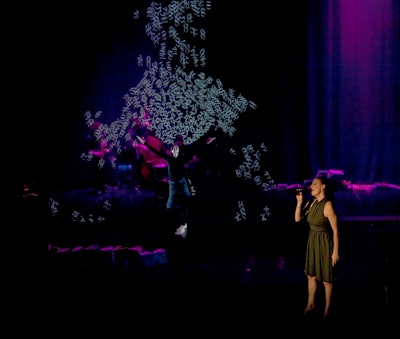 "Ten years later, I still don't see performances that take that kind of risk in a commercial event," Papatheodorou says of one of his most memorable events with Random Quark (pictured), where the studio organized an immersive dance performance for a book publisher and bookstore in Athens, Greece in 2012.Photo: Courtesy of Dr. Theo Papatheodorou
"Ten years later, I still don't see performances that take that kind of risk in a commercial event," Papatheodorou says of one of his most memorable events with Random Quark (pictured), where the studio organized an immersive dance performance for a book publisher and bookstore in Athens, Greece in 2012.Photo: Courtesy of Dr. Theo Papatheodorou
Memorable moments: One of Papatheodorou's most memorable events with Random Quark was an event he and his team organized for a book publisher and bookstore in Athens, Greece in 2012. "They organize a book award ceremony every year, and they wanted that year [of] the award ceremony to be special, with the use of advanced technology," he says.
Random Quark crafted an immersive, alternative experience that integrated a dance performance piece and a live jazz trio. The jazz music coordinated with the performer, and together they guided the audience through the "Land of the Book."
"The host introduced each award category as a new fantastical territory to be explored," Papatheodorou explains. "As the presenter introduced each territory, the performer's movements prompted real-time reactions from the dynamic projections. Essential literary elements—including letters, numbers, punctuation marks, and simple shapes—symbolized the constituents of each fictional domain."
Random Quark used cutting-edge computer vision algorithms and infrared industrial cameras to collect data about the performer on stage and fed that into a virtual world projected around them.
"All the elements on stage were responsive, something which brings on a great amount of risk in a live performance, but it was also very exciting and a real challenge," Papatheodorou says. "All elements on stage—the plants, the trees, the fish, the geysers, etc.—were all actors with their own behaviors and not mere props that were activated with the press of a button from backstage. Ten years later, I still don't see performances that take that kind of risk in a commercial event."
His vision for the future of the events industry: "I see the future of the events industry as a seamless amalgamation of immersive technologies and interactive experiences, transforming the way we experience and remember events," Papatheodorou says. "Personalizing will be key! Leveraging the power of artificial intelligence, augmented and virtual reality, and other emerging technologies, we will create adaptive experiences that cater specifically to each attendee."
On the planning side, Papatheodorou predicts that AI-driven systems will assist in the design, planning, and execution of events, streamlining processes and fostering collaboration between artists, technologists, and organizers.
"From curating personalized agendas to facilitating real-time translation and enhancing networking opportunities, AI will enable a more inclusive and accessible environment for diverse audiences," he says. "Hopefully this future will also take into account sustainability."




